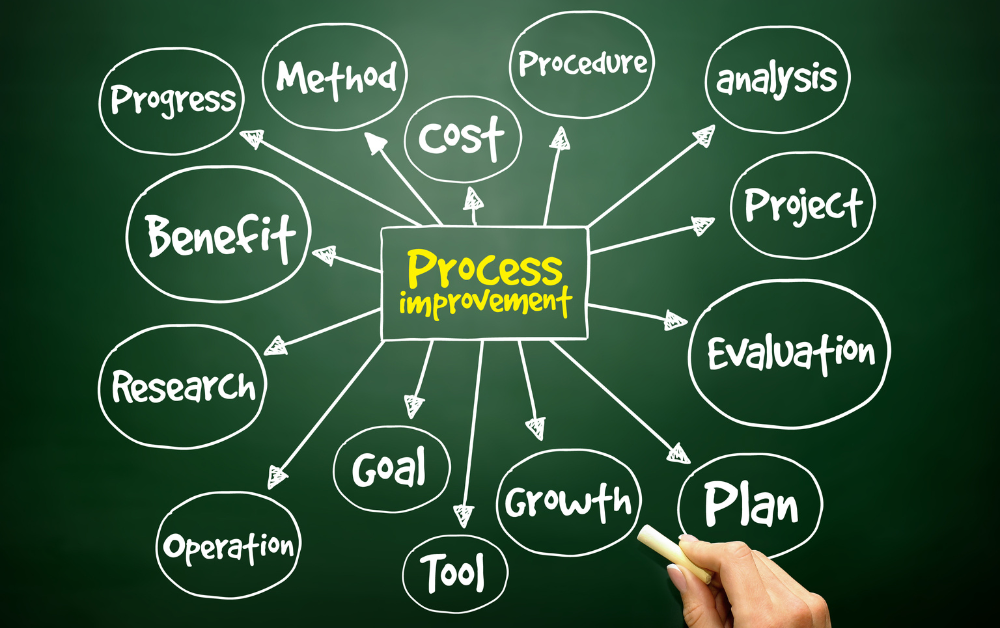Process improvement may not grab the press release headlines like a new product launch or record stock earnings, but the nitty gritty of constant refinement – the tweaking of the smallest detail to make something just a little better – is often the key reason for a business’s success or ultimate failure.
So many companies out there unfortunately have so many cumbersome and clunky processes – accounts payable, payroll, invoicing and collections, the list goes on and on – that need improvement. Processes that need to be broken down, defined, analyzed and then improved — and then performed consistently over and over to make them as efficient and seamless as possible.
For the better part of a century, the manufacturing industry has relied on a specific philosophy (Lean) and methodology (Six Sigma) – to refine these types of processes and boost operational excellence. And it’s the combination of the two – eliminating waste and amping efficiency with Lean, streamlining and improving quality with Six Sigma – where it gets exciting.
The numbers prove it, too: Over a 20-year period, it’s estimated the practice saved Fortune 500 companies an estimated $427 billion, and approximately 82% of Fortune 100 companies regularly integrate the practice into their operations today. It’s no surprise the industry has jumped head-first, wrote O.M. Ikumapayi for MaterialsToday:
“These methods … aim at helping the company processes focus mainly on the technique, which improves the productivity of a company by eliminating the processes which usually take time but yield very little productivity. The combination of these methods produces the best and most effective tools a company can possess to increase its overall productivity.”
The power of Lean Six Sigma is its ability to use a data-driven framework to thoroughly look at each process and identify the waste and bottlenecks. And the good news is what’s worked so successfully for manufacturing – reducing defects, streamlining the supply chain, reducing cycle time, etc. – can easily be applied to any industry and every operational process.
So, if you’re struggling with manual processes with a lot of back and forth, you may have just found your process improvement plan.
Making Waves in Manufacturing
Both Lean and Six Sigma have a rich history in manufacturing across the world: Lean was originally known as the Toyota Production System where it originated in Japan in the 1930s and 1940s, and Six Sigma was developed by Motorola in the 1990s as a way to reduce process variation for better quality and consistency. They both came together in the late 1990s and early 2000s with impressive results.
Through working with a certified Lean Six Sigma professional, companies can learn how to improve countless internal processes through a dedicated focus on waste reduction, better use of resources, cycle time reduction and overall process optimization. The approach goes after the root cause of each issue and works to achieve near perfection in each. In manufacturing, this is especially beneficial in key areas:
Inventory management (including reduced inventory levels and less waste)
Quality control (including improved customer satisfaction)
Cost savings (by eliminating waste and decreasing defects)
Capacity utilization (through optimizing processes)
The ripple effect can be substantial as well. Fewer defects, for example, means you’re throwing away less unusable products, which means fewer raw materials and energy are wasted. And with less defects, you can decrease how much time, energy and raw materials are used on fixing those defective products. Suddenly you have more time and attention to focus on making safer and more efficient work environments to further reduce accidents and malfunctions. You start to easily see why these big companies are saving so much money year after year!
Lean Six Sigma for All Businesses
You don’t have to stretch your imagination far to see that “waste” exists in every industry and in every process. Even if you’re not in the manufacturing industry, you likely see waste and variation every day in your own processes: pointless meetings, manual errors, excess paperwork, redundant tasks (or people), overcommunication, etc.
By not addressing the waste and the slight variation in these processes – in other words, by not establishing a streamlined process and repeating it consistently every day – you’re losing your competitive advantage (and likely adding to your daily frustrations).
On the flip side, some standardization and the establishment of a Lean Six Sigma infrastructure (with executive-level buy-in, of course) can be a game-changer, not just for the process in question but also at the enterprise level, as Sian Thompson Short wrote:
"No matter what they say, technology change is a whole lot easier when the overall process, process controls and operators of the process are standardized and consistent. A standard process also enables the definition of a set of business performance metrics and a global balanced scorecard that can be compared across teams, service lines and geographies."
Changing processes – particularly those ingrained in the culture of the business – is tough, and Lean Six Sigma can seem daunting to implement. Yet, it’s important to remember it’s really about starting with a mindset — one of continuous improvement and executing strategies to correct weaknesses wherever they may be.
No process you ever perform will be perfect, but it takes that continuous improvement mindset to make it as efficient as possible. Before long, you’ll naturally see quality and productivity improve, and likely ask yourself what took you so long to get started!
If you’re ready to improve – and your team is ready to roll up their sleeves – I’m ready to dig in with you. Process improvement may not grab the headlines, but saving time, saving money, freeing up capacity, improving profitability? Those all sound pretty good to me.
---
Alida Gasparini is a seasoned client accounting and advisory manager with extensive experience in consulting for real estate, professional services, and small business clients. She holds a Lean Six Sigma certification, underscoring her expertise in optimizing efficiency and works with clients to reduce waste and improve financial and operational performance. Her dedication to excellence is evident in every project she undertakes, and she has played a pivotal role in driving organizational growth and success.
To understand how the Lean Six Sigma methodology could help your business, reach out to Alida today at agasparini@mnadvisors.com.


